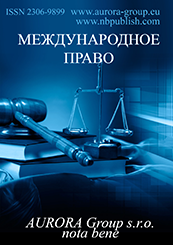Development of separate branches of international public law
Reference:
Cheshin, A.V., Goncharov, V.V., Petrenko, E.G., Malinovskii, O.N. (2025). Public control of outer space: towards the formulation of the problem. International Law, 2, 1–16. https://doi.org/10.25136/2644-5514.2025.2.72208
Abstract:
This article is devoted to the analysis of issues related to the possibility of organizing and implementing public control (control of the civil society of the peoples of the United Nations) over the processes of exploration and use of outer space. The authors note that outer space is of exceptional value and importance for the processes of conservation and development of mankind, since: the exploration of outer space in the last decade has been carried out at a rapidly growing pace; modern telecommunications technologies are not possible without the use of outer space; outer space is the most important condition for ensuring the defense security of states; the danger of environmental pollution of near space by waste has increased. There are serious risks of additional militarization of outer space (up to the placement of weapons of mass destruction in it); the activities of private economic entities in outer space are poorly controlled by the international community and the civil society of the peoples of the United Nations. A number of scientific research methods are used in the work, in particular: formal-logical; comparative-legal; historical-legal; statistical; sociological; method of analyzing specific legal situations. The authors note that the organization and implementation of public control (control of the civil society of the peoples of the United Nations) over the processes of exploration and use of outer space are fraught with a number of problems: the UN Charter and international legislation do not directly fix the grounds and limits of the implementation of this control; the norms of international space law do not always detail the possibility of participation of civil society institutions in the control of the study and use of outer space; there is no certainty as to which subjects of public control (control of the civil society of the peoples of the United Nations) should organize and conduct its activities for the processes of exploration and use of outer space; these subjects are not endowed with a set of real powers that can ensure the legality of the above-mentioned processes; these subjects have a weak material and technical base; there is no mechanism for bringing to legal responsibility those responsible for countering the legitimate control activities of the above-mentioned entities.
Keywords:
civil society, celestial bodies, Moon, UN, Russian Federation, democracy, problems, outer space, public control, international law
Development of separate branches of international public law
Reference:
Belyaev, I.Y. (2025). The main sources of legal regulation of international cooperation in countering the illegal drug trade and similar substances. International Law, 2, 17–30. https://doi.org/10.25136/2644-5514.2025.2.74066
Abstract:
The present study is dedicated to the analysis of sources of international cooperation in the fight against the illicit drug trafficking and similar substances. The author thoroughly examines the provisions of international treaty law, as well as international legal customs in the aspect of their capacity to serve as sources of international cooperation in combating the illicit drug trade and similar substances. The main sources of international law are studied systematically, and the criteria for their inclusion in the overall normative framework of international cooperation are analyzed. The criteria and principles for the formation of international legal customs are explored separately. The author examines the normative nature of customary norms based on the observance of two criteria: the existence of universal practice and the recognition of that practice as a legal norm (opinio juris). The methodology of the research includes a normative analysis of the provisions of key international treaties and a comparative legal study of doctrinal concepts of international cooperation. The author proposes a definition of international cooperation in the fight against the illicit trafficking of narcotic drugs and similar substances, which should be understood as a collaborative comprehensive activity of states based on international law norms to create and apply material and procedural international and domestic norms aimed at ensuring global and regional drug safety for the world community. The author establishes that international treaties (including UN normative conventions) as well as international custom are the main sources of international cooperation in combating the illicit drug trade and similar substances. At the same time, it is asserted that unilateral acts of states; acts of international law-making by international organizations; agreements between states and international organizations; and analogy are also sources of international cooperation, which must conform to the main sources. The scientific international cooperation in the field of combating drug crimes as a complex institution of international criminal law is also examined.
Keywords:
transnational crimes, drug addiction, drug crimes, sources of international law, international criminal law, international cooperation, illegal trafficking of drugs, international treaty, system of indirect application, international custom
 This work is licensed under a Creative Commons Attribution-NonCommercial 4.0 International License.
This work is licensed under a Creative Commons Attribution-NonCommercial 4.0 International License.
 Eng
Eng











 © 1998 – 2025 Nota Bene. Publishing Technologies. NB-Media Ltd.
© 1998 – 2025 Nota Bene. Publishing Technologies. NB-Media Ltd.




